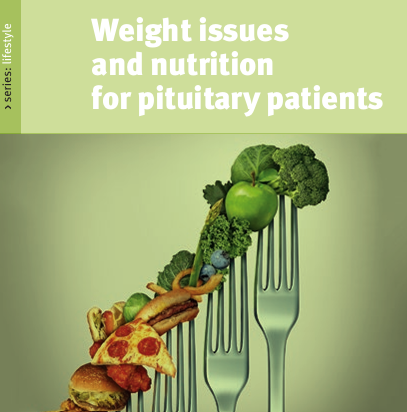Some pituitary conditions can cause weight gain, even though you may be following a diet similar to the one before you developed the condition. The sometimes unhelpful comment of ‘you need to diet’ can be upsetting for those who already follow a healthy diet and know that they do not take in any more calories than before their pituitary condition, or treatment, began.
A healthy diet is one which consists of:
- Protein (meat, poultry, fish, eggs and pulses)
- Carbohydrates (wholemeal bread, cereals and potatoes)
- Fat (oils, avocados, dairy products, nuts and fish)
- Other essential ingredients such as vitamins and some minerals – found in fruit and vegetables
Such a healthy diet is recommended by experts for everyone. People with hypothalamic damage may need to have a lower calorie intake to prevent further weight gain. Others may need to avoid or include particular foods because of their condition(s). Drinking sufficient fluids (water, sugar-free juices etc) will keep you hydrated; for those with AVP deficiency (diabetes insipidus), be guided by your thirst as to appropriate fluid intake and balancing your medication.
Understanding more about endocrine conditions and weight
Endocrine conditions can have many impacts on weight and your ability to exercise. It can feel difficult at times to understand the role your condition(s) may play in affecting your weight, and how much you can control this.
To help you understand this better, we hosted an online talk all about hormones, weight and nutrition. This talk, presented by Professor Jonathan Pinkney, explores the role of hormones and hormonal conditions in weight, and the different ways you can manage your nutrition and weight.
Further reading
The following longer reads can help you understand more about managing weight gain with your pituitary condition.











